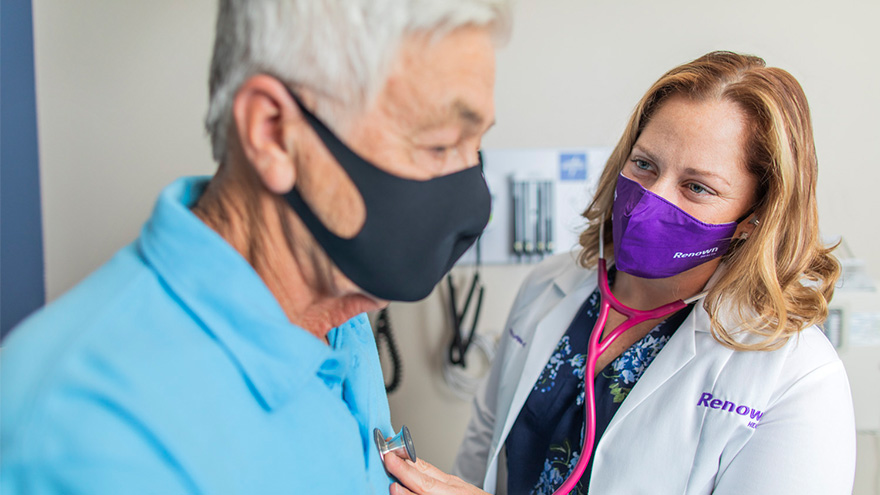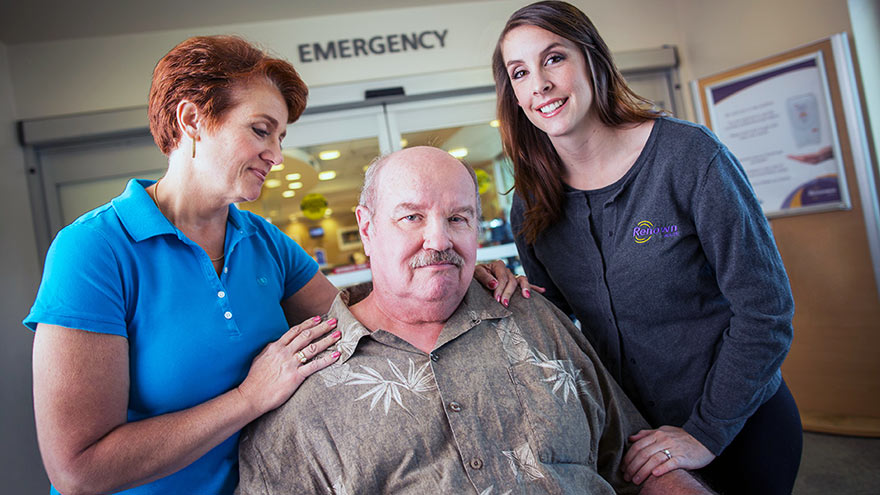Search
Results for 'medical records'
Clear-
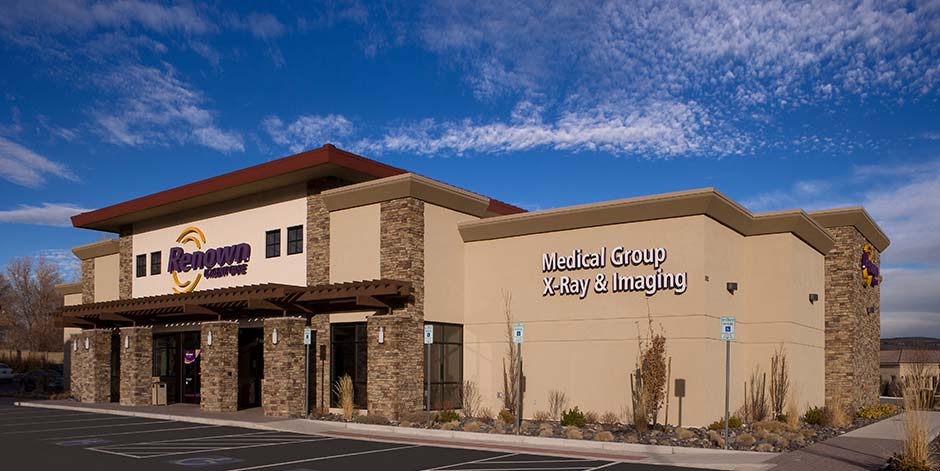 Renown Urgent Care - Los AltosRenown Urgent Care - Los AltosHours
Renown Urgent Care - Los AltosRenown Urgent Care - Los AltosHours
Mon-Fri8 a.m. - 7 p.m.Sat-Sun9 a.m. - 5 p.m. -
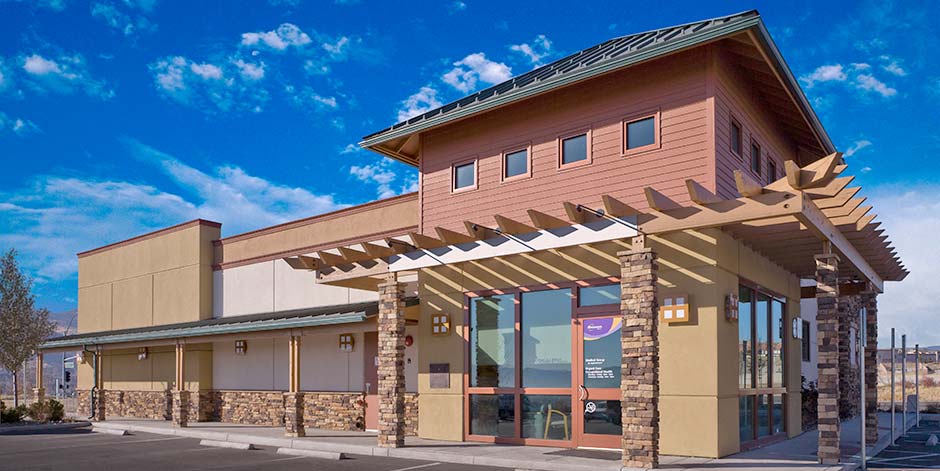 Renown Urgent Care - Summit RidgeRenown Urgent Care - Summit RidgeHours
Renown Urgent Care - Summit RidgeRenown Urgent Care - Summit RidgeHours
Mon-Fri8 a.m. - 7 p.m.Sat-Sun9 a.m. - 5 p.m. -
What to do if you Experience a Summer Burn
As families spend more time outdoors to enjoy the summer temperatures, it's important to be aware of potential hazards that can lead to burns – be it sunburns, burns sustained while grilling or navigating the hot surfaces often found around pool decks and parks. All these burn types are not only painful but can also cause severe damage to the skin and require immediate medical attention. Ross Albright, MD, an emergency care physician, explores effective preventive measures to avoid burns during the summer and discusses when it's essential to seek medical care. Stay Sun Safe While soaking up the sun is a favorite summer pastime for many, it's important to protect your skin from harmful ultraviolet (UV) rays. Sunburns not only damage the skin but also increase the risk of more severe burns. Follow these tips for staying safe in the sun: Apply broad-spectrum sunscreen with a minimum SPF of 30 before heading outdoors and reapply every two hours. Seek shade during peak hours of sun intensity, typically between 10 a.m. and 4 p.m. Wear protective clothing, such as wide-brimmed hats, sunglasses and lightweight, long-sleeved garments. Fire and Hot Object Safety Summer is full of fun outdoor activities like BBQs, campfires and fireworks, all of which can pose a fire hazard if not handled carefully. To prevent burns caused by fires: Maintain a safe distance from open flames and grills and always use oven mitts or potholders when handling hot objects. Keep a fire extinguisher and a first aid kit readily available. Keep children away from hot objects and fireworks and educate them about the dangers of touching or playing with them. Hot Surface Safety Asphalt, metal slides and surfaces around the pool retain heat and are likely to be significantly hotter than other materials such as a wooden picnic table to grassy pathway (these can still be hot too!). So, it's crucial to be cautious around these materials to prevent burns: Use caution when near hot surfaces surrounding water sources, such as pool decks or metal slides. Always wear shoes when walking on hot surfaces such as asphalt, concrete and even sand. Ensure that playground equipment such as slides and swings are cool to the touch before your kiddos start climbing around. Recognizing Severity of Burns and Seeking Care Despite our best efforts, burns can still occur. It's essential to know when a burn requires medical attention: First-degree burns, characterized by redness, pain and minor swelling, can typically be treated at home with cool water and over-the-counter pain relievers such as ibuprofen (Advil or Motrin) or acetaminophen (Tylenol). Second-degree burns, which may cause blistering and more intense pain, should be evaluated by a healthcare professional. Third-degree burns, indicated by charring or blackened skin, deep tissue damage or burns that cover a large area, require immediate emergency care. Preventing burns during the summer is paramount to enjoying a safe and enjoyable season. By following these tips, you can significantly reduce the risk of burns and ensure prompt medical attention when necessary. Stay informed, stay safe and have a burn-free summer! If you or someone you know experiences a burn, it's important to seek immediate medical care.
-
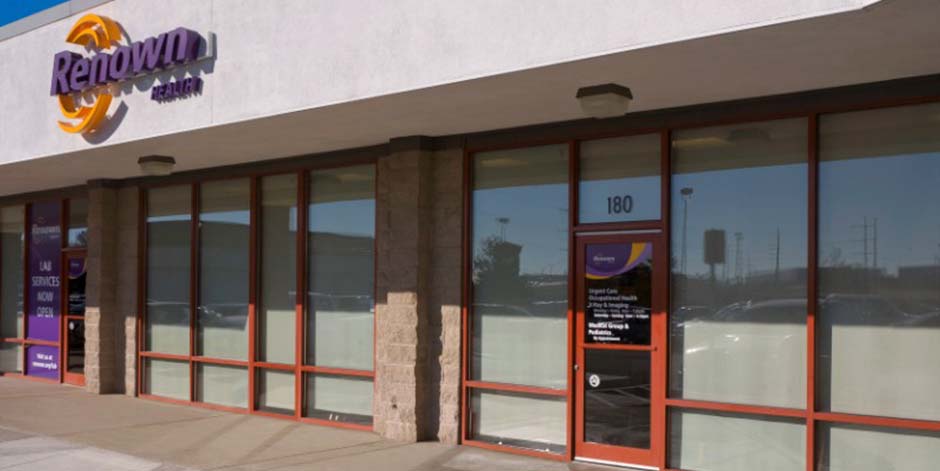 Renown Urgent Care - North HillsRenown Urgent Care - North HillsHours
Renown Urgent Care - North HillsRenown Urgent Care - North HillsHours
Mon-Fri8 a.m. - 7 p.m.Sat-Sun9 a.m. - 5 p.m. -
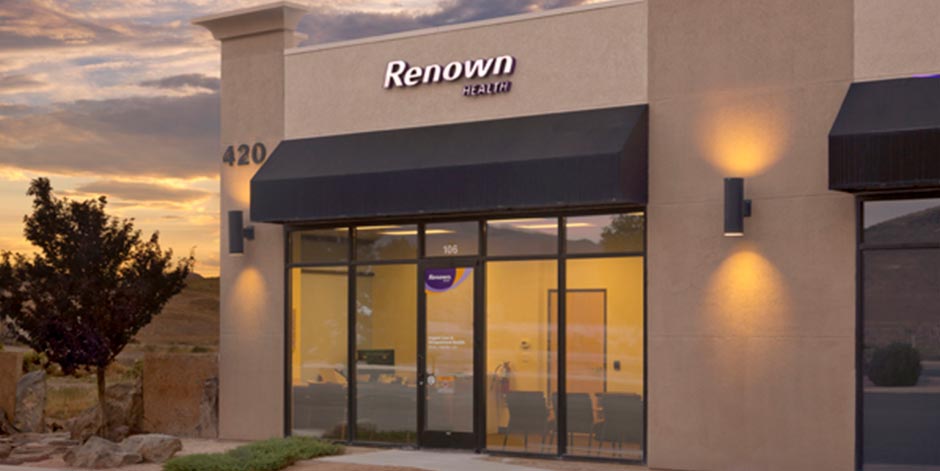 Renown Urgent Care - USA ParkwayRenown Urgent Care - USA ParkwayHours
Renown Urgent Care - USA ParkwayRenown Urgent Care - USA ParkwayHours
Mon-Fri8 a.m. - 5 p.m.Sat-SunClosed -
Primary Care vs. Urgent Care vs. The ER
When seeking medical care, there are several different provider types and options from which to choose. For example, you may have asked yourself a common question: Should I go to my primary care provider, urgent care or the emergency room? Sarah Herbert, APRN with Renown Medical Group – South Carson, provides guidelines to help you easily make this decision. When should you go to the Emergency Room (ER)? Making a visit to the ER should be reserved for severe symptoms and/or life-threatening conditions, including: Chest pain Severe shortness of breath or difficulty breathing Weakness or numbness on one side Slurred speech Fainting/loss of consciousness Continuous bleeding or major open wounds Severe allergic reactions Coughing or throwing up blood Drug or alcohol overdose Sharp pain in lower abdomen Severe dehydration and not responding to nausea medication (needing IV fluids) High fever that does not get better with medicine Serious burns Broken bones/dislocated joints Head trauma Find an Emergency Department Near You If you’re still unsure of where to go for appropriate medical care, it’s best to check with your primary care physician. And remember, for a life-threatening emergency, call 9-1-1 immediately!
-
Three More Renown Urgent Cares Now Accepting Patients with Medicaid for a Total of Six Locations Across Northern Nevada
Renown Health now offers urgent care services to patients with Medicaid insurance at the locations on USA Parkway, Los Altos and in Carson City. Renown’s 10 Urgent Care locations see patients 365 days a year for medical concerns that are urgent but not life-threatening. Renown has recently expanded the number of urgent care sites accepting Medicaid insurance to include the USA Parkway, Los Altos and Carson City locations. Medicaid provides health coverage to thousands of Nevadans, including eligible low-income adults, children, pregnant women, elderly adults, and people with disabilities. Medicaid is now accepted at six Renown Health Urgent Care locations at the following addresses: 440 NV-439 #1, USA Parkway 202 Los Altos Pkwy, Sparks 2814 N. Carson St., Ste 101, Carson City 975 Ryland St., Reno 1343 W. Newlands Dr., Fernley 560 E. Williams Ave., Fallon “As Reno’s only not-for-profit health care provider, we see all patients, regardless of their ability to pay. Increasing access to urgent care medical services remains a priority for us,” said Brian Erling, MD, MBA, Renown Health President, and CEO. “With a lack of medical providers and long wait lists for care in Washoe County, many people may not seek treatment when ill, and their conditions become more advanced, making treatment more difficult and costlier. We are working to hire additional physicians and medical providers to meet the need. We are pleased to help reduce barriers to care by accepting people with Medicaid insurance at six urgent care locations in Reno-Sparks and in our neighboring communities.” Government initiatives like Medicaid are designed to help uninsured individuals secure health care coverage. Medicaid is the largest health insurance provider in the United States, providing coverage to millions of Americans. As of July 2023, 835,888 Nevadans have enrolled in Medicaid and CHIP (Children’s Health Insurance Program). Statistics show that 21% of people in Washoe County have Medicaid coverage (2021). “We continue to seek new ways to meet the healthcare needs of everyone in our community,” said Rahul Mediwala, MD, CPE, Renown Medical Group CEO. “Our skilled providers at all Renown Urgent Care locations are able to diagnose and treat a variety of non-life-threatening illnesses, including respiratory illness; allergic reactions; minor burns, cuts and bites; sprains; urinary tract infections and more.” For life-threatening emergencies and when urgent care locations are closed, the Emergency Rooms at Renown Regional Medical Center, Renown South Meadows Medical Center and Renown Children’s Hospital are ready to treat and care for all patients, 24/7. The current hours of operation for all Renown Health locations are available at renown.org/locations. About Renown Health Renown Health is the region’s largest, locally governed, not-for-profit integrated healthcare network serving Nevada, Lake Tahoe, and northeast California. With a diverse workforce of more than 7,000 employees, Renown has fostered a longstanding culture of excellence, determination, and innovation. The organization comprises a trauma center, two acute care hospitals, a children’s hospital, a rehabilitation hospital, a medical group and urgent care network, and the region’s largest, locally owned not-for-profit insurance company, Hometown Health.
-
When to Seek Care for Abdominal Pain
Abdominal pain is one of the most common complaints that brings individuals to the emergency room. We spoke with emergency physician Bret Frey, MD, to ask about when and where to seek care for abdominal pain. Dr. Frey advises that any time you feel something is developing inside your body that is substantially different from what is normal for you, understand that something is wrong. He further explains that warning signs of an acute medical situation include fever, vomiting or a rapid change in function and ability to move due to pain. These symptoms indicate that one needs to be evaluated by a medical professional. This evaluation will include the care team conducting an examination and asking a series of questions to determine if additional diagnostics, such as lab work or imaging, are needed. Be prepared to discuss where the pain is and what it feels like, in addition to how long it’s been bothering you and if it’s constant or intermittent. While appendicitis often comes to mind when thinking about abdominal pain, Dr. Frey says that this is not the bulk of cases that the Emergency Department sees. In fact, often the pain does not have a specific diagnosis, but our team of board-certified emergency physicians are experienced in assessing and caring for those experiencing the acute symptoms he described. “We often don’t come away with an answer about exactly what it is, but we substantially rule out life threats in a very methodical and systematic way,” said Frey. The abdomen includes many organs, including the stomach, liver, small and large intestines, gallbladder and pancreas. In addition, pain stemming from your chest, pelvis or back may be felt in the abdominal area. If you are experiencing abdominal issues that are persistent but not an emergency, talk to your primary care doctor about what you are experiencing, and be prepared to review the history of this pain, medications, allergies and diet. He or she will be a good partner to review conditions such as gas, heartburn, constipation, diarrhea, inflammation or menstrual and ovulation pain. Drinking plenty of water is always an important part of supporting your health.
-
Your Ultimate Cold and Flu Survival Guide
While viruses can attack year-round, colds, flus and other respiratory illnesses are typically more prevalent during fall and winter. People spend more time indoors, which allows viruses to pass more easily from one person to another. The cold, dry air can also affect the respiratory system, making it more susceptible to germs. According to the CDC, flu activity in the U.S. often begins to increase in October and peaks between December and February. “Flu season” can last as late as May. When it comes to the cold and flu, prevention and preparation are key. Getting the flu shot and a COVID-19 vaccine is the first and most crucial step in protecting against these two respiratory illnesses. Preventative actions, such as washing your hands, covering your mouth and nose when coughing or sneezing and getting enough sleep can also help you avoid getting sick. However, despite your best prevention efforts, the time may come this winter when you start to feel a little scratch in your throat or a fever coming on. By taking steps ahead of time to assemble a cold and flu survival kit, you’ll be more prepared for whenever illness strikes, allowing you to stay home, rest and avoid spreading germs. Tips for Managing Symptoms Keep these tips in mind to ease your cold or flu symptoms: Stay home and rest Drink plenty of fluids Treat aches and fever with over-the-counter medication such as ibuprofen or acetaminophen Manage a cough with over-the-counter expectorants or suppressants Run a humidifier or sit in a steamy bathroom to ease congestion What to Stock in Your Flu Survival Kit Be ready when a cold or the flu strikes by having a flu survival kit filled with these get-well essentials stocked in your pantry, fridge and medicine cabinet: Over-the-Counter Medications: Take advantage of over-the-counter medications to make yourself feel better and ease most common flu symptoms of fever, headache, cough, muscle aches, sore throat, and runny or stuffy nose Pain relievers - Ibuprofen (Motrin and Advil) or Acetaminophen (Tylenol): for fever and aches Decongestants: for sniffles and congestion Cough expectorant (guaifenesin): for a “wet” cough to help clear secretions from the lungs Cough suppressant (dextromethorphan/DM): for a severe “dry” cough to block the cough reflex Cough syrups and drops Drinks: Water Herbal tea Low-sugar sports drinks Pedialyte Foods: Chicken soup Broth Vitamin C-containing fruits and vegetables Oatmeal Toast (add some avocado, honey or egg) Miscellaneous items: Tissues Lozenges Protective mask Thermometer Humidifier When to Seek Care and Where to Go Most healthy adults who have a cold, the flu, or other mild respiratory illnesses don’t need to see a care provider and will recover at home with self-care measures. Because these are viral illnesses, antibiotics won’t work against treating them. Your care provider may be able to prescribe an antiviral medication that can relieve your symptoms and shorten the duration and severity of your illness; however, this needs to be started within 48 hours of symptom onset and is often only prescribed to individuals at high risk for developing complications from the flu or those experience severe symptoms. Primary Care or Urgent Care Contact your primary care provider or visit an Urgent Care if you are at an increased risk, including those who: Are 65 years of age or older Have chronic medical conditions Are pregnant or recently gave birth Have a weakened immune system Find a primary care provider If you are otherwise healthy and not at increased risk of complications, seek medical advice if your flu symptoms are unusually severe, such as mild difficulty breathing, a severe sore throat, coughing that produces a lot of green or yellow mucus, or feeling faint. Emergency Care Go to the Emergency Department if you are experiencing emergency warning signs such as severe pain (chest, abdomen), concern for heart attack or stroke (slurred speech, new localized weakness), severe dehydration (needing IV fluids) or severe shortness of breath.
-
Got a Cough, Runny Nose, Sore Throat and Fever? It Might Be RSV Virus
Renown Urgent Care team prepares you to stay alert and safe this season and is available for medical assistance, 7 days a week at 11 locations across northern Nevada. In June, staffers at the Centers for Disease Control and Prevention sent a Health Advisory requesting that clinicians and caregivers watch for the respiratory syncytial virus, usually known as RSV, an infection that puts thousands of toddlers and senior citizens in the hospital each year with pneumonia and deep lung inflammation. According to the CDC, RSV results in roughly 58,000 hospitalizations and 100 to 500 deaths each year among children under five as well as 177,000 hospitalizations and 14,000 deaths among adults 65 and above. RSV was cropping up in 13 southern and southeastern states, the agency warned, and clinicians should test for the virus if kids showed up sneezing, wheezing, or with poor appetites and inflamed throats. Usually a winter infection, RSV is usually gone by June. Instead, this year, it is spreading—and has since continued to spread across the country, and to northern Nevada. “We know that many of the good hygiene habits we developed to defend against COVID-19 disrupted the viral landscape over the past 16 months, suppressing infections from almost every pathogen. Now RSV’s out-of-season return tells us that we need to continue to be on the alert,” says Robert Thole, MD, a physician with Renown Urgent Care. “We are surprised to be seeing so many kids with RSV right now.” “We ask parents and caregivers to keep a watchful eye out for a respiratory syncytial virus (RSV) infection. Symptoms are usually mild and resemble those of the common cold. RSV infection sometimes leads to bronchiolitis, pneumonia, or both. Symptoms of these complications include; difficulty breathing; wheezing; coughing that is getting worse; lethargy, increased tiredness, decreased interest in surroundings, or loss of interest in food,” explains Dr. Thole, who is board certified in family medicine. Catching and spreading the virus People with RSV infection may spread the virus through their secretions (saliva or mucus) when they cough, sneeze, or talk. You can catch the virus by: Touching an object or surface contaminated with the virus and then touching your nose, eyes, or mouth without first washing your hands. The virus can survive for more than 6 hours on countertops and other hard surfaces, such as doorknobs, and for 30 minutes on hands, clothing, or tissue. Close contact. If an infected person coughs or sneezes near you, you could breathe in RSV that is in his or her saliva or mucus. The virus spreads easily in crowded settings, such as childcare facilities, preschools, and nursing homes. Children attending school often spread the virus to their parents and siblings. The incubation period—the time from exposure to RSV until you have symptoms—ranges from two to 8 days but usually is 4 to 6 days. People are most likely to spread the virus within the first several days after symptoms of RSV infection begin and remain contagious for up to 8 days. Babies and young children may spread the virus for at least 3 to 4 weeks. Most children and adults feel better after a week or two. Treatment For an otherwise healthy child who has symptoms of an upper respiratory infection, such as a cough or runny nose, home treatment usually is all that is needed. It is important to watch for signs of complications, such as dehydration. Watchful waiting may not be a good choice when your child with an upper respiratory infection has an increased risk for complications. Watch your child closely if there are symptoms of an upper respiratory infection. If symptoms get worse or new symptoms develop, see a doctor right away. There is no vaccine and few specific treatments aside from supportive care, such as administering pain relievers and fluids. In the most severe cases, some children or adults might need additional oxygen. Not just in kids, older adults at risk Dr. Thole explains, “RSC is not only seen in children. Adults older than 65 have an increased risk of complications following infection with RSV. Pneumonia is a particular risk, especially if other health problems exist, such as chronic obstructive pulmonary disease (COPD) or heart failure. It may take older adults longer to recover from RSV infection and its complications than people in other age groups.” Call 911 or other emergency services immediately if: Your child has severe trouble breathing. Your child's breathing has stopped. Start rescue breathing. Call your doctor now if your baby or child has moderate trouble breathing. Call a doctor if your child: Breathes slightly faster than normal and seems to be getting worse. Most healthy children breathe less than 40 times a minute. Has cold symptoms that become severe. Has shallow coughing, which continues throughout the day and night. Has a poor appetite or is being less active than usual. Has any trouble breathing. Hospitalization Doctors sometimes give a monoclonal antibody treatment to high-risk babies throughout the respiratory season to prevent them from catching the virus or developing a severe infection. Some hospitals have started to increase use of the prophylaxis in response to the recent uptick in RSV cases. “Those kids were being protected,” said Kristina Deeter, MD who was quoted in a July 1st Wall St. Journal article on this topic. Dr. Deeter is a pediatric intensivist and medical director at Renown Children’s Hospital Pediatric Intensive Care and Hospitalist Medicine. Dr. Deeter, who also oversees Pediatrix Medical Group’s critical-care team in dozens of pediatric intensive care units across the country, said hospitals are also considering taking additional precautions in the neonatal intensive-care unit similar to some wintertime protocols. At Renown Children’s Hospital, there were no children hospitalized with RSV throughout the winter season, Dr. Deeter said, when there are normally hundreds of cases in our county- many of which do not need to be hospitalized.” A total of 31 cases have been reported in Washoe County, Nev., since April, and 26 of those occurred within the past three weeks. Preventing infection To prevent infection, or at least to mitigate them, wear masks, stay home when sick, and washing hands could make a difference in how the next viral season unfolds. For more information on RSV, visit renown.org. Renown Urgent Care Renown Urgent Care is available for medical assistance, 7 days a week at 11 locations across northern Nevada providing treatment for a wide range of minor injuries, illnesses and medical concerns that are urgent but not life-threatening. If you require same-day medical attention, you can avoid the long wait times and high prices of the emergency room at 13 convenient sites, including Reno, Sparks, Carson City, USA Parkway, Fallon and Fernley. You can walk-in or book ahead online. About Renown Health Renown Health is a locally governed, not-for-profit integrated healthcare network serving northern Nevada, Lake Tahoe and northeast California. Renown is one of the region’s largest private employers with a workforce of more than 7,000. It comprises three acute care hospitals, a rehabilitation hospital, the area’s most comprehensive medical group and urgent care network, and the region’s largest and only locally owned not-for-profit insurance company, Hometown Health. Renown has a long tradition and commitment to improve the care and the health of our community. For more information, visit renown.org.
Read More About Got a Cough, Runny Nose, Sore Throat and Fever? It Might Be RSV Virus
-
Three Emergency Room Options for You and Your Family
Renown Health has three emergency rooms open 24 hours a day, seven days a week, ready to serve our community. We checked in with Amy Hawkins, Manager of Clinical Nursing at Renown South Meadows, to learn more about the emergency room experience and how each can accommodate your emergency care needs. 1. Renown Regional Emergency Room The emergency room at Renown Regional Medical Center is the only Level II Trauma Center between Sacramento and Salt Lake City, treating more than 80,000 ER and trauma patients annually. Services Offered: This location offers immediate emergency care covered by general surgeons and coverage by the specialties of orthopedic surgery, neurosurgery, anesthesiology, emergency medicine, radiology and critical care. In addition, tertiary care needs include cardiac surgery, hemodialysis and microvascular surgery. (Patients may be referred to a Level I Trauma Center.) Renown Regional ER Location 2. Renown South Meadows Emergency Room South Reno is expanding, and so is Renown South Meadows ER! Exciting transformations are happening across this campus, including the new 121,000-square-foot specialty care center and upgrades to the existing medical center—expanding care to our patients. Added benefits to the more intimate setting at South Meadows: Smaller ER also means more personal experience. The team traditionally has more time to spend with each patient at the bedside. A smaller campus means convenient parking, as the ER is just outside the front entrance; however, patients are reminded to follow marked road signs when approaching the campus during construction. Most patients arrive by private vehicle versus an ambulance, so we are very accustomed to thinking quickly on our feet. Benefits to new construction: A new Cath lab will allow us to treat patients experiencing a heart attack and needing immediate intervention to open vessels in their hearts. Additional lab and imaging capabilities for our patients Services Offered: This location offers immediate emergency care staffed with board-certified emergency physicians. Patients can expect one-on-one interactions with trusted providers and shorter wait times. All emergency room services are open during construction, and patients are reminded to follow marked road signs when approaching the campus. South Meadows ER Location 3. Renown Children's Hospital Emergency Room This location offers immediate emergency care, with pediatric specialists always on staff. In addition, the Children's ER lobby is ideal for our littlest patients, with a child-friendly atmosphere and vibrant colors to help decrease the anxiety accompanying emergencies. Medical equipment is sized just for kids, and we offer a distraction machine, games and movies to help children cope with what can be a traumatic experience, like getting an IV. In addition, we have Child Life Specialists available to provide emotional support to both children and their families. When to Bring Your Child to the ER: Allergic reactions Asthma attacks Baby under three months old with a temperature higher than 100.4 degrees Fahrenheit Broken bones Burns Choking or poisoning Difficulty breathing Eye injuries Fainting, dizziness and confusion Head injuries Heart attack Rashes Seizures Severe bleeding Severe headache Severe pain Skin infections Stitches Stroke Venomous stings and bites Renown Children's Hospital Location
Read More About Three Emergency Room Options for You and Your Family
-
Attending Burning Man? Health Tips From Renown
Renown Health welcomes you back from Burning Man. To make sure you have the support you need, here are some tips on where to get healthcare after your return from the playa. Our urgent cares see patients 365 days a year for medical concerns that are urgent but not life-threatening. This can include fractures, cuts, burns, sprains, fevers, animal bites, rashes, sore throats and fevers. Where To Get COVID-19 & Monkeypox Tests in Reno-Sparks Renown Health’s emergency rooms do not provide walk-in COVID-19 or monkeypox testing for patients. If you are experiencing symptoms related to COVID-19 or monkeypox, we recommend you make an appointment with your primary care provider or visit one of our urgent care locations. Testing for COVID-19 is also available at local pharmacies in the Reno-Sparks area. Please visit Washoe County's COVID-19 page to learn more. Labor Day Holiday Hours: Fernley and Fallon urgent care locations will be open from 9 a.m. to 3 p.m. on Monday, Sept. 5; all other Renown urgent care locations are open from 9 a.m. to 5 p.m.
Read More About Attending Burning Man? Health Tips From Renown
.jpg?rev=f89fdc95b1824f868e98988928b0a6bb)
